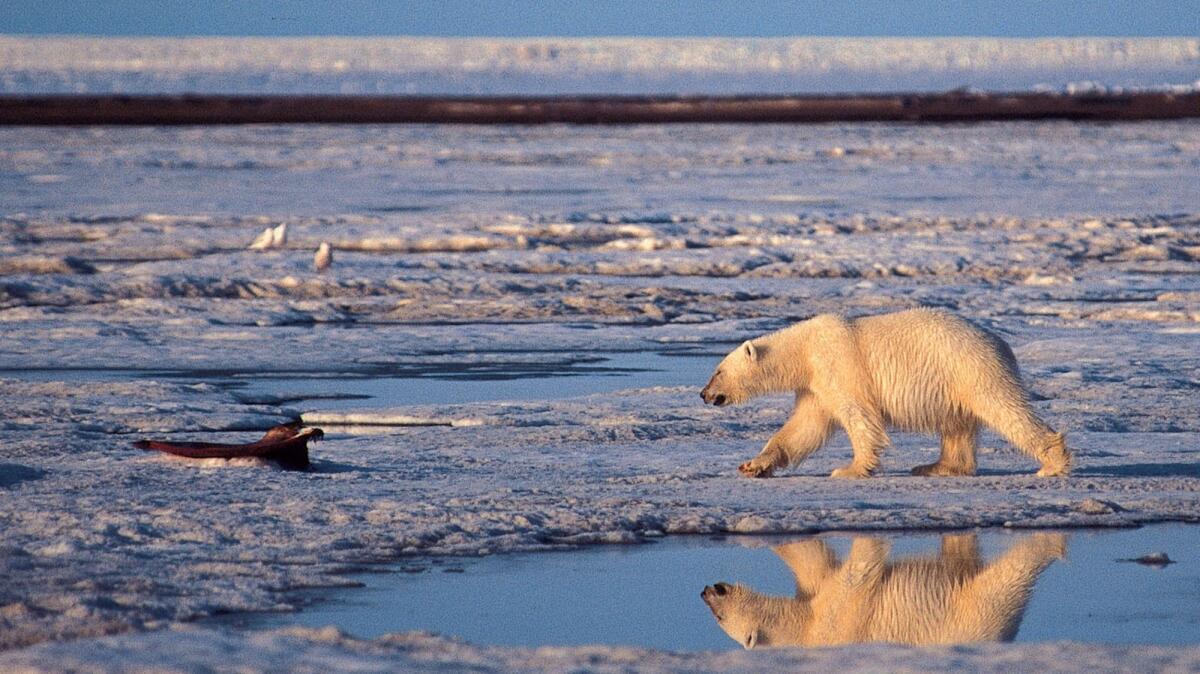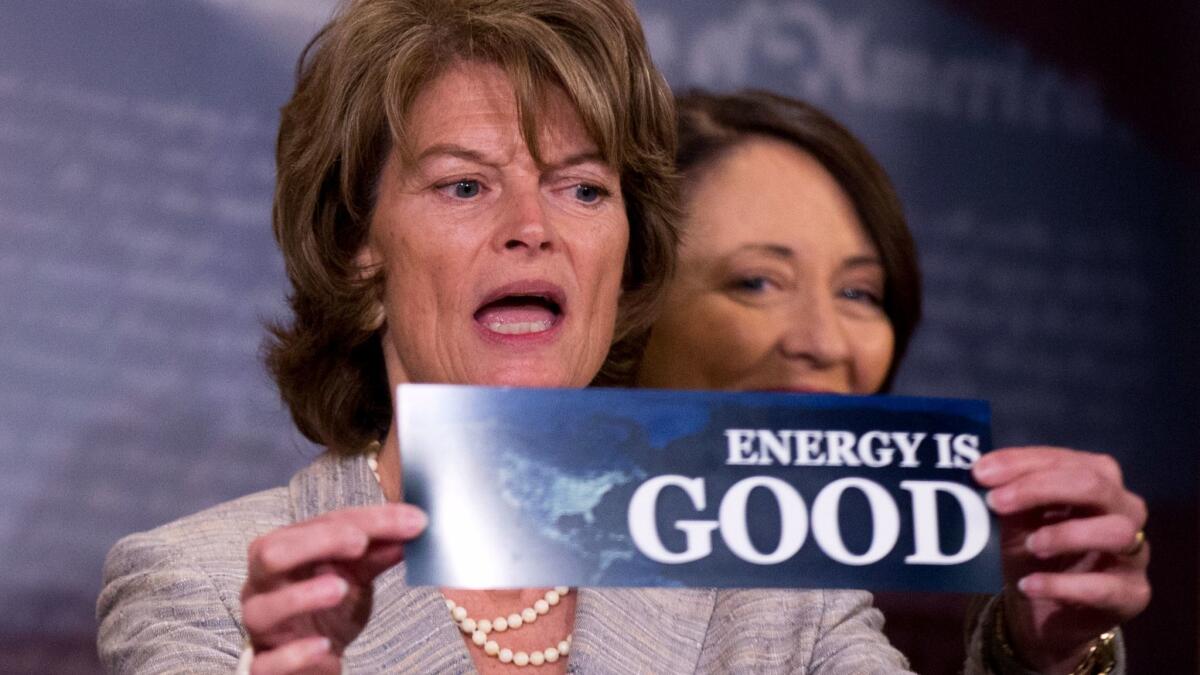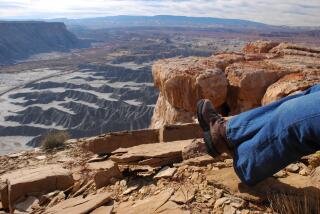Republicans see new chance for oil drilling in Arctic National Wildlife Refuge

- Share via
The last time congressional Republicans mounted a serious push to open the Arctic National Wildlife Refuge to oil exploration, they painted America as a desperate petroleum mess. The need, they said, was clear. The country consumed and imported more oil than ever before, produced less than at any time since World War II and paid near-record prices.
Still, the 2005 bid to drill in the 19.6-million acre wilderness in Alaska failed as Democrats and some Republicans, supported by major environmental groups, pushed back with a politically popular message to conserve one last immense expanse of pristine wildlands from industrial depredation.
For the record:
2:30 p.m. Oct. 18, 2017An earlier version of this article contained a reference to the 1022 area. It is 1002.
Today, U.S. oil production is nearing a record 10 million barrels a day, imports are at the lowest level since the mid-1990s and prices are less than half of what they were a decade ago. Against that backdrop, the Republican-led Congress again appears to be focused on drilling in the Arctic refuge.

As part of the process for preparing the new federal budget, the Senate is expected to approve a resolution late this week that instructs the Senate Energy and Natural Resources Committee to write legislation that generates $1 billion in revenue. The committee’s chairwoman is Alaska Sen. Lisa Murkowski, a three-term Republican who has consistently expressed her devotion to new revenue from the Arctic refuge to replace dwindling oil revenue from Alaska’s North Slope.
At a Capitol Hill news conference Tuesday, prominent Democrats said they viewed the $1-billion demand as a clear signal that Republicans are prepared to wage the fifth consequential political struggle since 1977 that pits oil production against Arctic wilderness protection.
Democrats vowed to block any bill that contains provisions that threaten the refuge.
“This is nothing more than a Big Oil polar payout,” said Sen. Edward J. Markey (D-Mass.), who, as a member of the House, helped lead the 2005 opposition campaign. “This heartless budgetary scam underscores the backward priorities of President Trump and congressional Republicans.”
Republican lawmakers and their allies held their powder. The offices of Murkowski and the Energy and Natural Resources Committee did not respond to requests for interviews. Neither did the American Petroleum Institute, which has consistently supported oil exploration in the Arctic refuge.
The Arctic National Wildlife Refuge was established in Alaska’s northeast corner in 1960 by President Eisenhower “for the purpose of preserving unique wildlife, wilderness and recreational values.” Oil companies first formally expressed their interest in exploring the immense expanse of mountain, tundra and coastal plain in 1977 and were rebuffed by President Carter. In 1980, Congress approved expanding the refuge and also designated 1.5 million acres along the Arctic Ocean coast, known as the 1002 area, to be specifically set aside to study its potential for oil and gas development.
In early March 1989, the Senate approved a measure to lease the coastal plain for energy development. But the proposal died weeks later after the Exxon Valdez ran aground and spilled its cargo into Alaska’s Prince William Sound. In 1995, Congress tried again and approved a bill that included coastal oil exploration in the refuge. It was vetoed by President Clinton.
Though the 2017 Republican strategy to use the budget-writing process to open the Arctic is similar to the strategy that failed 12 years ago, the message and the forces aligned to support exploration are different. This year, Republican lawmakers are not stressing a dire need for new oil supplies. Instead, they say opening the refuge’s 1.5 million-acre coastal plain to exploration would generate enough revenue from oil leases and royalties to help reduce America’s budget deficit.
Trump and Interior Secretary Ryan Zinke also see opening the refuge to exploration as an important piece of the administration’s campaign for “American energy dominance.” In May, in a speech he delivered in Anchorage to the Alaska Oil and Gas Assn., Zinke signed a secretarial order that directs his agency to update scientific assessments and create a new plan to develop energy resources on the refuge’s coastal plain and in the National Petroleum Reserve, which lies west of the refuge.
“I’m a geologist,” said Zinke, whose order was greeted with jubilation by Alaska Gov. Bill Walker, an independent, and the state’s congressional delegation, all Republicans. “Science is a wonderful thing. It helps us understand what is going on deep below the surface of the Earth. We need to use science to update our understanding of the 1002 area of the Arctic National Wildlife Refuge as Congress considers important legislation to responsibly develop there one day.”
Environmental leaders say congressional Republicans are doing the bidding of a fossil fuel sector that is steadily losing market demand in the United States and globally to fuel-efficient engines and the advance of electric vehicles. Oil prices, they argue, are too low to attract companies to undertake expensive exploration and drilling operations in some of the planet’s harshest weather and in a roadless wilderness.
Several environmental leaders interviewed also noted that they anticipated the issue and have been preparing since Trump’s inauguration in January to again argue their case for preventing energy development in the refuge.
“The American public recognizes that the Arctic National Wildlife Refuge is a special place. It represents America’s best idea of preserving our natural heritage. This is a crown jewel of that idea,” said Ana Unruh Cohen, director of government affairs at the Natural Resources Defense Council. “Even in 2005, we rallied to protect it when prices were high. Now, we’re exporting oil. It’s not like we need to sacrifice any of the Arctic for oil company profits.”
Schneider is a special correspondent.
ALSO
Is this the year the Arctic National Wildlife Refuge will be targeted for oil drilling?
Congress votes to allow controversial hunting practices in Alaska
Trump administration to reconsider protections for rare sage grouse
More to Read
Sign up for Essential California
The most important California stories and recommendations in your inbox every morning.
You may occasionally receive promotional content from the Los Angeles Times.










